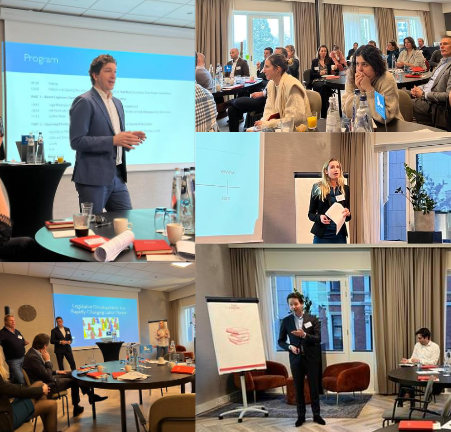On January 20, AmCham’s People Committee organized a seminar on recent and upcoming legislative and policy changed that will impact the way we work in 2023 at Park Centraal in Amsterdam.
Elke Roelant (Deputy Director at AmCham) and Mark Poort (Director Social & Public Affairs at Randstad / Chair People Committee) gave some welcome remarks.
Madeleine Molster (Lawyer Employment & Industrial Relations Law at Sagiure Legal) talked about the EU directive ‘Transparent and Predictable Working Conditions’ and gave an overview of changes in labor law in the past few years.
Epke Spijkerman (Partner Employment Law at Buren Legal) discussed ‘Wet werken waar je wilt’. He explained that working from home is not a legal right. Therefore, the goal of this law is to give employees more influence over where they do their work. How it works is that the employee can make a request to work from anywhere in the EU and this request must be considered by the employer. Initially the employer must grant a request of the employee to adjust the place of work, unless ‘weighty business or service interests’ oppose to it. The SER recommended changing this principle to ‘standards of reasonableness and fairness’. This means that the request can be denied if it is in line with this standard. Examples of employer’s interests are social cohesion, team cooperation and heavy administrative or financial burden. The interests of employees include informal care, saving travel time, mental health, and productivity.
Marijn van der Heiden (Senior Advisor Employment Conditions and Labor Relations at AWVN), Sophie Boucher (Sr Dir, Assistant General Counsel at Palo Alto Networks) and Frank Veltkamp (VP Human Resources Label & Graphic Materials at Avery Dennison) participated in an interactive HR Panel during which they discussed how they incorporate these pieces of legislation into their own companies.
Prof. mr. dr. Ruben Houweling (Professor Labor Law at Erasmus University Rotterdam / Crown-appointed Member of the SER) delivered his keynote on Minister Karien van Gennip’s Policy Letter. He stated that the number of self-employed workers has increased by over 300.000 in the last 10 years, meaning that they now take up almost 13% of the labor market. We have also seen a decrease in employment contracts and an increase in self-employed workers in, for example, the healthcare sector. The reason for this is that, financially, being self-employed comes with more benefits than having an employment contract. As a result, Minister van Gennip has dedicated her policy letter to ‘working as and with a self-employed worker’. She proposes to reduce tax benefits, enforce mandatory disability insurance, introduce public enforcement (inspection) and update the legal framework by redefining the meaning of ‘subordination’ and rebut the presumption of employment. All so that employments contracts become more attractive than an self-employed basis.
The seminar closed with a Q&A and discussion and a delicious lunch where guests got the opportunity to network with one another.
AmCham cordially thanks Mark Poort, Madeleine Molster, Epke Spijkerman, Marijn van der Heiden, Sophie Boucher, Frank Veltkamp and Ruben Houweling for their contribution to this seminar and Park Centraal for their hospitality.
